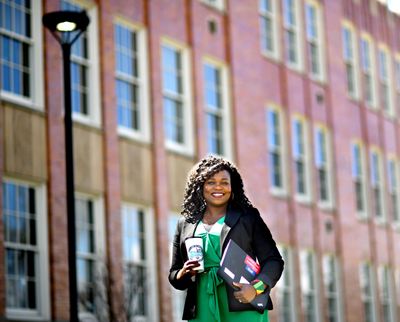On the Front Lines: Spokane mom empowers young women to continue working toward their goals amid coronavirus crisis

Editor’s note: Our series On the Front Lines recognizes those in the community who are confronting the coronavirus pandemic head-on, while the rest of us do our part by stepping back.
When Jaime Stacy founded Strong Women Achieving Greatness (SWAG), she hoped to equip and empower young women to not only believe in themselves but each other.
Three years later, SWAG has become a bridge keeping middle and high school girls connected to school during the coronavirus pandemic.
Many SWAG members have struggled with not having the resources they need to complete distance learning, as well as the massive disruption to the routine they have worked to build into their lives.
Stacy told her girls bringing school home is “bringing something into an environment that has not always been there.”
“It’s like bringing an alien into your house,” Stacy said. “I call it the E.T. All these kids with their Chromebooks, that’s their E.T. They’re trying to figure it out.
“And I’m like, here’s the thing about E.T. He doesn’t stay here. He will eventually go home, you will eventually go back to school.”
Stacy first began mentoring students through a different program, but was surprised to find that she was the only female mentor on the team.
So she founded SWAG, a program that focuses on building relationships not just with adult mentors but also between peers.
The group is focused on creating a space for girls who have struggled with behavioral, social or emotional issues and need support and accountability to work through them. SWAG is for “any young girl that those things have become a hindrance to their success,” Stacy said.
Stacy brings in women from the community to speak to the members of SWAG and share their paths to success.
“Whenever a child sees someone in a space that looks like them, they’re more likely to understand or to see what success might look like in that space, and it seems more attainable,” Stacy said.
Stacy was careful not to associate an ethnicity with SWAG, because many of her members struggle with blending their biracial identities.
A few weeks ago a young middle school girl who was interested in joining SWAG told Stacy that the “white side” of her was the one succeeding.
“And I said, ‘Really? So the black side of you was just, like, chillin’, not doing any work?’ ” Stacy said.
The girl re-evaluated and then said it was the black side that succeeded.
“I said how about both, because that’s who you are,” Stacy said.
SWAG is intentional about helping young girls make declarations about who they are and what they can achieve.
“It’s not denying any part of them that is successful,” Stacy said.
The program recently expanded from a group at Rogers High School to groups at Garry and Shaw middle schools, with plans to expand to more schools in the near future.
Stacy was born and raised in southeast Missouri before moving to Spokane about 20 years ago.
She had her “first career” in finance before getting married and becoming a stay-at-home mom for 12 years.
“Well, I say I’m a domestic engineer,” Stacy said.
She has two children. Her son had a kidney transplant recently, and Stacy’s husband was the donor. The family had to be isolated for four months after the transplant. The family had just come back to Spokane from Seattle in December and started to resume normal life before the pandemic put everyone in isolation.
“I know what this feels like,” Stacy said of returning to self-isolation.
Via social media, Stacy has been sharing tips and tricks with her SWAG members for continuing to succeed and accomplish goals while in quarantine.
“You have got to have a routine in order to have focus in your day,” Stacy said. “Having that right there, it creates a pattern.”
Some students have struggled to fall into a pattern because they don’t have internet access or transportation to pick up homework and food from their school.
Stacy said there has been a big push for food donations and distribution during the pandemic, but personal hygiene products, especially feminine hygiene products, have not been as readily available to low-income students.
Part of having a routine is self-care, Stacy said.
Little things like lip balm, hand lotion or nail polish can make all the difference in young women feeling good about themselves while struggling with the repercussions of a massive change in routine, she said.
“It’s just a token or a gesture,” Stacy said. “I’m thinking about you as a woman and a young lady.”